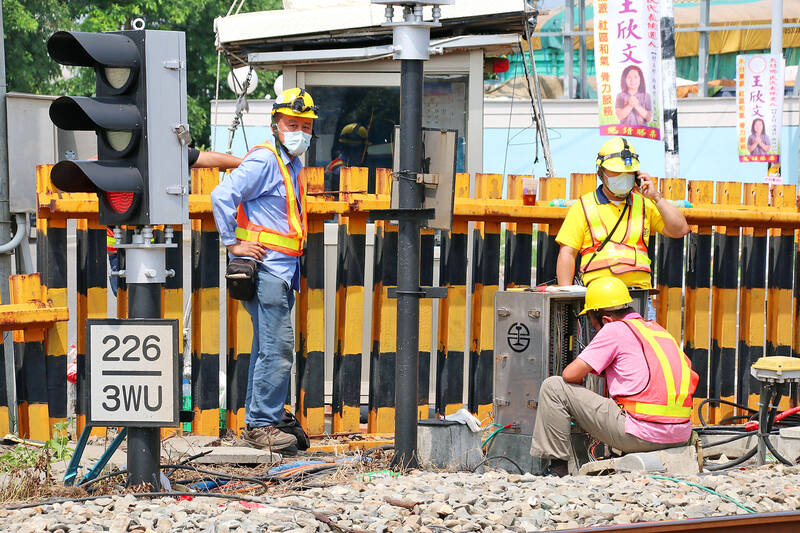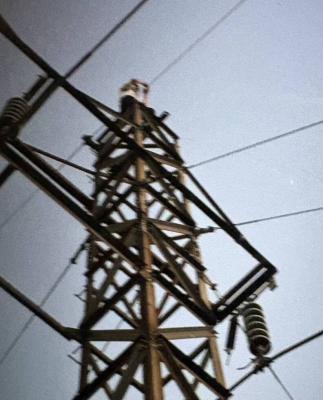A crossing gate malfunction that prevented street traffic from passing a railroad in Changhua County on Friday night was caused by a defect in a signaling system, Minister of Transportation and Communications Wang Kwo-tsai (王國材) said yesterday.
The malfunction occurred between Huatan and Yuanlin stations, and also affected access to local restaurants, the Taiwan Railways Administration (TRA) said.
The Ministry of Transportation and Communications said it hoped the issue would be fixed by yesterday night.

Photo: CNA
TRA Director-General Du Wei (杜微) and Deputy Minister of Transportation and Communications Hu Hsiang-lin (胡湘麟) yesterday visited Yuanlin Station to inspect the repair efforts.
The TRA had asked equipment manufacturer Siemens Taiwan and independent experts to visit the site to assist the efforts, Hu told a news conference at the site.
Hu said that the malfunction occurred when the signals sent by an axle counter could not be received by the system, citing a briefing he received during a visit to an engineering room near Yuanlin Station.
The counter had been replaced, but the issue occurred again soon after, he said.
The TRA earlier suspected that a signal defect on Jhongjheng W Road caused the gate to malfunction, but later ruled that out.
Instead, power surges that occur in the system when a train passes the axle counter might be to blame, the agency said.
The TRA was inspecting the system’s circuits and hoped to resolve the issue before service resumes today, Hu said.
However, a specific time cannot be guaranteed, he added.
The malfunction occurred as an increased number of passengers were expected to travel during the Mid-Autumn Festival long weekend, Du said.
The TRA is monitoring train traffic on the affected section, and if the number of travelers rises to a certain threshold, additional bus services would be offered to divert passenger flow, Du said.
People affected by the malfunction and subsequent safety measures can apply for refunds under the TRA’s standard refund mechanism, Du said.
As of noon yesterday, more than 53 trains and 9,574 passengers had been delayed by more than 47 hours, the TRA said.
Hu urged the agency to step up repair efforts and apologized to passengers on trains delayed due to the malfunction.

‘ANGRY’: Forgetting the humiliations and sacrifices of ‘the people of the Republic of China’ experienced disqualified Lai from being president, Ma Ying-jeou said Former president Ma Ying-jeou (馬英九) yesterday criticized President William Lai (賴清德) over what he called “phrasing that downplayed Japan’s atrocities” against China during World War II. Ma made the remarks in a post on Facebook on the 80th anniversary of the end of World War II. Ma said he was “angry and disappointed” that Lai described the anniversary as the end of World War II instead of a “victory in the war of resistance” — a reference to the end of the Second Sino-Japanese War (1937-1945). The eight-year war was a part of World War II, in which Japan and the other Axis

The Mainland Affairs Council (MAC) yesterday announced a ban on all current and former government officials from traveling to China to attend a military parade on Sept. 3, which Beijing is to hold to mark the 80th anniversary of the end of the Second Sino-Japanese War. "This year marks the 80th anniversary of the end of World War II and the Republic of China’s victory in the War of Resistance [Against Japan]," MAC Deputy Minister and spokesperson Liang Wen-chieh (梁文傑) told a regular news briefing in Taipei. To prevent Beijing from using the Sept. 3 military parade and related events for "united

‘OFFSHORE OPERATIONS’: Also in Dallas, Texas, the Ministry of Economic Affairs inaugurated its third Taiwan Trade and Investment Center to foster closer cooperation The 2025 Taiwan Expo USA opened on Thursday in Dallas, Texas, featuring 150 Taiwanese companies showcasing their latest technologies in the fields of drones, smart manufacturing and healthcare. The Taiwan External Trade Development Council (TAITRA), the event’s organizer, said the exhibitors this year include Hon Hai Precision Industry Co (Foxconn), the world’s largest contract electronics manufacturer; AUO; PC brand Asustek Computer; and drone maker Thunder Tiger. In his opening speech, TAITRA chairman James Huang (黃志芳) said he expected Texas to become a world-class center for innovation and manufacturing as US technology companies from Silicon Valley and Taiwanese manufacturers form an industrial cluster

A 20-year-old man yesterday evening was electrocuted and fell to his death after he climbed a seven-story-high electricity tower to photograph the sunset, causing a wildfire on Datong Mountain (大同山) in New Taipei City’s Shulin District (樹林), the Taoyuan Police Department said today. The man, surnamed Hsieh (謝), was accompanied on an evening walk by a 20-year-old woman surnamed Shang (尚) who remained on the ground and witnessed the incident, capturing a final photograph of her friend sitting atop the tower before his death, an initial investigation showed. Shang then sought higher ground to call for help, police said. The New Taipei